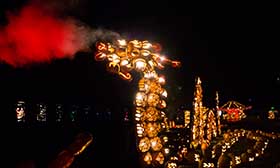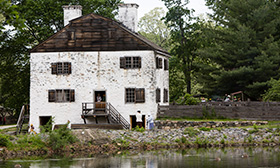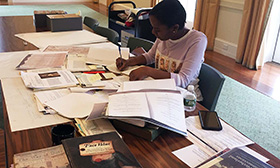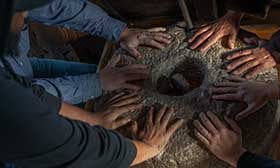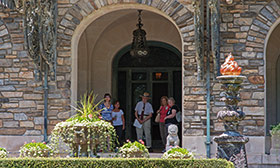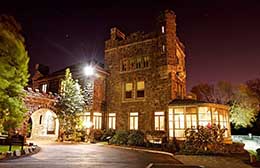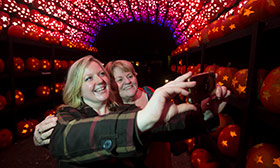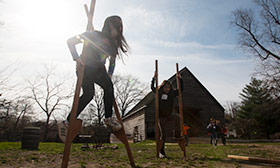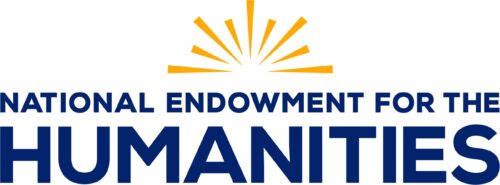Slavery in the Colonial North
A National Endowment for the Humanities Institute for K-12 Educators
The institute will present slavery as a central element of American economic and political development in the North as well as the South and will equip participants with the tools needed to teach this history to their classes with accuracy and sensitivity.
This Institute will be hosted by Philipsburg Manor, a historic site which has been interpreting the story of northern slavery for over 20 years. The program of study will be centered around Historic Hudson Valley’s award-winning interactive documentary People Not Property: Stories of Slavery in the Colonial North, which provides historic context and models an interpretive approach centered on the stories of enslaved individuals. Academic readings selected by Institute faculty discuss how slavery developed in the United States as well as educational frameworks to help students engage with this difficult but important history.
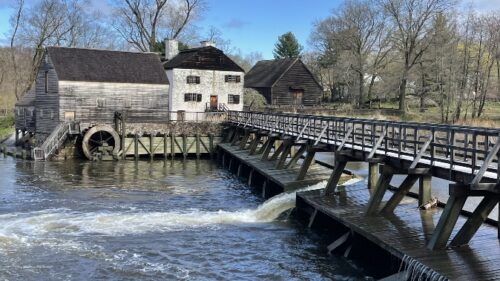
QUICK FACTS
Dates: Sunday, July 13 through Friday, July 18, 2025
Location: Philipsburg Manor, Sleepy Hollow NY
Size: 30 educators
Stipend: $1300 (considered taxable income)
Application Deadline: March 5, 2025 at 11:59 PM Pacific Time
Participant Deadlines: April 2: Applicant Notifications, April 16: Applicant Acceptance Deadline
Accommodations: Historic Hudson Valley has negotiated special lodging arrangements for participants at the Center at Mariandale in nearby Ossining, NY. Climate-controlled, fully-accessible rooms are single occupancy, with shared bathroom space, and include three meals a day (dietary restrictions can be accommodated). Lunch will be to-go meals that participants can bring with them to Philipsburg Manor. The total cost to participants is $780. Participants who prefer other lodging can seek out hotels or AirBnB rentals in the vicinity, which typically run around $200/night.
Arrival & Ground Transportation: Public transportation is available between NYC airports and Philipsburg Manor. The Center at Mariandale is accessible by taking the MetroNorth to Ossining and then a short taxi ride to the center. Participants are responsible for arranging for ground transportation between their lodging and Philipsburg Manor.Participants may choose to carpool with other participants between Mariandale and Philipsburg Manor or to take the MetroNorth between Ossining and Tarrytown. Walking and/or taxi may be necessary to/from MetroNorth stations
General Schedule: The workshop will meet daily, typically from 9:30am-4:30pm. Participants are expected to be present for the full run of the workshop. Slavery in the Colonial North will offer a range of methods for engagement, including large group lecture/discussion, small group discussions, site visits, and individual assignments. Faculty will offer office hours for scholars to reflect on the week’s discussion.
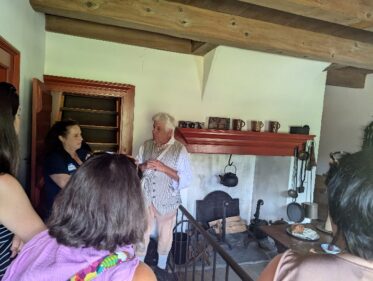
Program of Study
The workshop’s guiding text and organizing structure will be the interactive documentary People Not Property: Stories of Slavery in the Colonial North. Each day will focus on one chapter of the website. Visiting lecturers with varied professional and academic backgrounds will model different methodologies and pedagogical approaches to this history. Daily sessions will balance faculty lectures with group discussions that support the development of strategies and frameworks teachers can use to bring this important but difficult subject to the classroom, while site visits to Philipsburg Manor, Van Cortlandt Manor, and the Yesterday memorial will offer opportunities for participants to explore the power of place-based history. Throughout, the Institute will apply Historic Hudson Valley’s methodology that focuses on studying the stories and experiences of real people to personalize the past.
Essential Questions
The following questions will help to structure scholars’ inquiry over the course of the workshop:
- How did the development of colonial America depend on the institution of slavery?
- Why should the history of slavery be integrated into the study of colonial America?
- In what ways can the written and physical record be biased, obscuring our ability to interpret American slavery and the lives of enslaved individuals?
- How can we adjust the ways that we look at these resources in order to understand them more fully?
- What is the legacy of slavery in our communities today?
- How do we address and repair that legacy in our classrooms?
- How do we teach the difficult narrative of our nation’s past?
- What choices are implicit or explicit in the ways that we teach this topic?
- How can we teach it more fully and accurately in our classrooms today?
Schedule Overview Please Note: Schedule is subject to change
-
- Sunday, July 13: Introductions. Institute Co-Directors and other key staff will welcome participants and provide an Institute overview, followed by participant introductions. Staff will lead presentations on Historic Hudson Valley’s approach to teaching the history of Northern Slavery, as well as an overview of Institute resources, People Not Property, and Kofi’s Fire. A tour of Philipsburg Manor will provide the background to discuss how enslavement became crucial to the development of the American colonies.
- Monday, July 14: Defining Slavery. Dr. Leslie Harris will provide an overview of slavery in colonial America, including the institutions that developed around slavery and how slavery was built into the political structures of colonial government. Dr. Harris will also trace the historiography of slavery studies. Dr. Christy Clark-Pujara will lecture on how the economy in New England and New York became tied to slavery and how individuals navigated that system.
- Tuesday, July 15: Being Enslaved. Dr. Christy Clark-Pujara will present on the legal and economic institutions of slavery and center the experiences of the enslaved, including the ways in which experiences of enslavement varied across time, geography, and among individuals, tracing the history of slavery from the colonial to the New Nation periods. Then, the group will receive a tour of Van Cortlandt Manor to hear stories of enslaved individuals navigating the turmoil of the American Revolution and New Nation period.
- Wednesday, July 16: Choosing Resistance. Dr. Harris and Institute staff will address paths of overt and covert resistance and self-liberation, focusing on the events of the New York Conspiracy of 1741. Then, Deirdre Hollman, the K-12 Director, will present on how strategies for engaging K-12 Learners when teaching the history of slavery.
- Thursday, July 17: Pursuing Justice. Dr. Sarah Gronningsater will present on gradual emancipation in New York and the experiences of enslaved individuals throughout this period. The group will then travel to nearby Irvington to visit Yesterday, a community-initiated memorial to enslaved people in the colonial North. Back at Philipsburg Manor, Sarah Cox and Cathy Sears will present on the process of conducting research and organizing to fund, advocate for, and construct Yesterday. Participants will explore ways they can engage with local organizations to deepen their and their students’ engagement with this difficult history.
- Friday, July 18: Bringing This Back to the Classroom. The day will begin with a group visit to Van Cortlandt Manor. Then, in the afternoon, participants will work together in groups to develop a lesson they could use in their classrooms that builds on the content discussed that week. Scholars will have time in the afternoon to work on their reflection papers and meet with Institute Faculty.
Reflection Paper
At the end of the institute, scholars will be asked to write a 500-word essay reflecting on the week’s content and how they plan to apply it to their future projects. Questions to consider could include:
- What have you learned over the course of the week? What lectures/discussions/experiences resonated most with you?
- Do you have ideas for lesson plans or class discussions around the content?
- Which of the engagement strategies discussed will work for your students?
- What particular challenges do you face as an educator teaching this content?
- How can you bring what you have learned this week to your colleagues?
- Which of Historic Hudson Valley’s resources related to this history will be most useful to you, your students, and/or your colleagues?
- Are there local organizations or historic sites you could get involved with to engage your students with this content?
- Is there more support you could get from Historic Hudson Valley to teach this content?
Eligibility and Expectations
For more information on NEH Guidelines regarding eligibility and expectations, please consult the following resources from NEH:
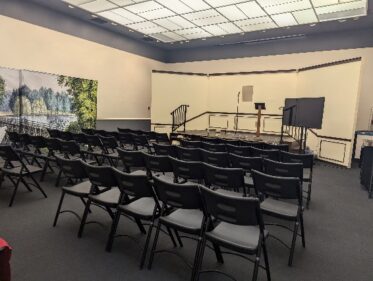
Accessibility & Inclusion
Historic Hudson Valley makes every effort to create an inclusive and accessible experience for all participants. While the Visitor Center at Philipsburg Manor is wheelchair accessible, not all spaces on the historic core are accessible. Both visual and virtual tours of inaccessible spaces are available to participants who are unable to access these spaces. Parking, including wheelchair accessible parking spaces, is available on site at the Philipsburg Manor Visitor Center. Historic Hudson Valley will provide transportation via shuttle bus for day trips to Van Cortlandt Manor and Irvington. Please note that the shuttle is not wheelchair accessible and alternate transportation will be arranged as needed. Sign language interpretation can be arranged for participants upon request.
Faculty
Institute Directors
Leslie M. Harris, Ph.D., Academic Director
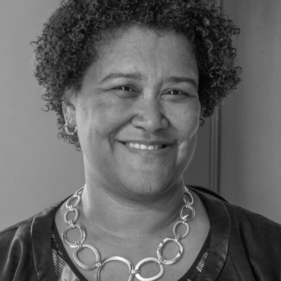
Leslie M. Harris is a Professor of History and African American Studies at Northwestern University. A specialist in Pre-Civil War African American history, she has authored or co-edited five books, including the award-winning In the Shadow of Slavery: African Americans in New York City (2003) and most recently Slavery and the University: Histories and Legacies (2019, with James T. Campbell and Alfred L. Brophy). Harris has also participated in a number of public history projects, including the award-winning “Slavery in New York” exhibition (2005-2007) at the New-York Historical Society, and the accompanying book (with Ira Berlin); the re-interpretation of the urban slave quarters at Telfair Museum’s Owens-Thomas House in Savannah, Georgia, which included the edited volume Slavery and Freedom in Savannah (2013, with Daina Ramey Berry); and the interactive website People Not Property with Historic Hudson Valley. As the inaugural David L. Wagner Distinguished Fellow at The Newberry Library (2022-23), Harris will complete Leaving New Orleans: A Personal Urban History, a book that combines memoir with family, urban and environmental histories to explore the multiple meanings of New Orleans from its founding through its uncertain future amid climate change. Harris received her undergraduate degree at Columbia and her doctoral degree at Stanford. Before moving to Northwestern, she taught for 21 years at Emory University. Her work has also been supported by the Harvard Radcliffe Institute, the Mellon and Ford Foundations, the Schomburg Center for Research in Black Culture, the Institute for Historical Studies at the University of Texas, and the University of Maryland.
Nicole Wallace, Institute Project Director
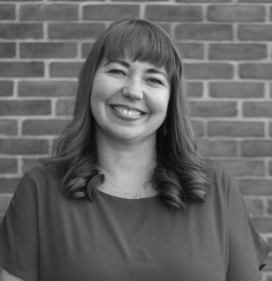
Ms. Wallace is the Director of Education at Historic Hudson Valley and oversees both public and school programs at all five of Historic Hudson Valley’s sites. She has a Master of Science in Education from the Museum Leadership program at Bank Street College and has nearly 14 years of experience as a leader in developing, implementing, and evaluating programs in a museum setting, as well as experience in creating and delivering accredited professional development trainings for educators.
Deirdre Hollman, K-12 Director
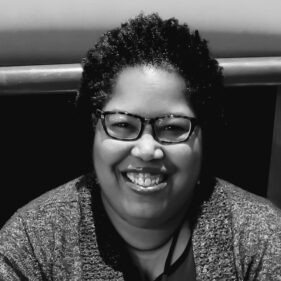
Deirdre Hollman is the founder of the Black Comics Collective, a cultural, educational, publishing and digital forum for connecting comic creators of color with the youth and communities in New York City. She is also a doctoral student in social studies education at Teachers College, Columbia University. Her work focuses on racial and visual literacies in social studies curriculum and teaching, Black studies in community education spaces, and Black futurity and speculative thought in education. She has a B.A. in art history from Princeton University, a M.S.Ed. in museum education from Bank Street College, and an Ed.M. in social studies from Teachers College. She served as Director of Education and Exhibitions at the Schomburg Center for Research in Black Culture for fifteen years, where she created and sustained innovative programs such as the Junior Scholars Program, the Teen Curators Program, the Black History 360° Summer Education Institute, and the Black Comic Book Festival. Her recent publications include “Critical race comics: Teaching Black subjectivities and racial literacy” (2021) in the Journal of Curriculum & Pedagogy and Pop Culture and Curriculum Assemble! Exploring the limits of curricular humanism through pop culture (DIO Press), which she co-edited. She is a teacher educator whose courses include Ethnic Studies, Diversity in the Social Studies Curriculum, Social Studies Methods, and Critical Race Comics: The African American Experience. She is an educational consultant specializing in culturally relevant and sustaining curriculum and pedagogy for museums, cultural institutions, community-based organizations, and schools.
Guest Lecturers and Speakers
Dr. Christy Clark-Pujara, University of Wisconsin, Madison
Sarah Gronningsater, PhD., University of Pennsylvania
Sarah Cox, Irvington Commemorate Project
This Institute is made possible by the National Endowment for the Humanities: Democracy demands wisdom. Any views, findings, conclusions, or recommendations expressed in this website and its accompanying materials do not necessarily represent those of the National Endowment for the Humanities. NEH does not condone or tolerate discrimination or harassment based on age, color, disability, sex (including pregnancy, sexual orientation, and gender identity), genetic information, national origin, race, or religion. Nor does NEH condone or tolerate retaliation against those who initiate discrimination complaints (either formally or informally), serve as witnesses, or otherwise participate in the Equal Employment Opportunity (EEO) process, or oppose discrimination or harassment. For further information, write to the Equal Opportunity Officer, National Endowment for the Humanities, 400 7th Street, SW, Washington, DC 20024. TDD: 202-606-8282 (this is a special telephone device for the Deaf).

